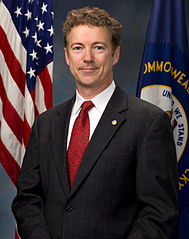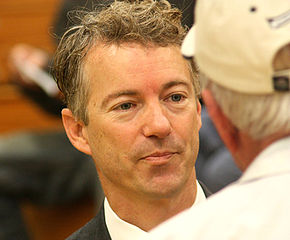News
Rand Paul on policy issues

Senator Rand Paul (R-Kentucky) polls well, but does not always interview well. Why not? Rand Paul pushes the professional media and political class out of their comfort zones. And when he does that, lots of people pay attention. As they should.
Rand Paul in polls and the hot seat
Quinnipiac University regularly runs polls. Despite (or maybe by reason of) their leftward skew, those polls have won the respect of media outlets everywhere. So this latest press release from them must shock the media and political elite. The headline says it all: Paul Blooms as Clinton Wilts. One can read the full report here. In brief: Rand Paul statistically ties Hillary Clinton in Colorado, Iowa, and Virginia. In fact, every Republican polls better against her now than they did in February, the last time Quinnipiac checked. But no one should lose sight of the larger point: Rand Paul polls at least as well as, or better than, does any other Republican.

Rand Paul speaks to a concerned citizen at a town hall meeting in Louisville, Kentucky, in 2009. Photo: Gage Skidmore, CC BY-SA 3.0 Unported License
But when he gives interviews to the mainstream media, he does less well. This morning he had a spat with Savannah Guthrie of the Today show. True, her questions showed how little imagination many mainstream media reporters have. Vaccines voluntary? Horrors! Except the vaccines themselves make the real horror show. Ms. Guthrie did not take the trouble to find that out. But Rand Paul needs to point that out. The job of running for office includes looking into things like that and telling the people. He should leave complaining about media bias to others. (Like this outlet.)
Rand Paul made part of his problem by changing his foreign-policy stand. He used to stand for non-intervention, as his father did. Four years in the Senate likely taught him how dangerous the world has become with the de facto non-intervention of Obama. No matter. At least one “527” ran an ad accusing him of “backing Obama on the Iran deal.” They used statements he made years ago. He could and should have said, “That was then. This is now.” Instead his staff sent cease and desist letters to media outlets across the country. (This according to the hosts of The Five on the Fox News Channel.)
He has a case. And enough people know he has a case, to tip that Quinnipiac poll. And that case has more to it than ceasing to prosecute drug possession as a felony.
Rand Paul on abortion
The vaccine issue doesn’t excite the Democratic Party constituents too much. The abortion issue does. In a New Hampshire interview, someone asked him why he would let a State restrict abortion, and why every State should. For answer, he suggested someone ask Debbie Wasserman-Schultz whether she would accept killing a seven-pound infant so long as said infant hadn’t yet dropped through the birth canal.
And Wasserman-Schultz fell neatly into the trap:
Here’s an answer. I support letting women and their doctors make this decision without government getting involved. Period. End of story. Now your turn, Senator Rand Paul.
How did she expect him to answer her back? This way:
[So] her answer is yes, that she’s okay with killing a seven-pound baby.
And the evidence backs him up. Life begins either at conception, at viability, or at birth. So how do Democrats, independents, and Republicans feel about that?
When you break down life at conception, ability to live outside the womb, and at birth, the breakdown along party lines is hardly a surprise. With Democrats, the breakdown is (39/20/31). I guess what you should take from this is that life at conception Democrats have an 8-point lead over those who feel it begins at birth. Independents have a breakdown of (52/22/13), and Republicans have the strongest numbers regarding life at conception (71/17/7).
Rand Paul has another reason to know what he’s talking about. Before he entered the Senate he had a private practice as an eye doctor. And all doctors take an oath not to harm others. That oath, as Hippocrates of Cos first wrote it three hundred years before Christ, runs, in part, thus:
I will [not] give to any woman a pessary to cause abortion. But I will keep pure and holy my life and my art.
Rand Paul on foreign policy
Savannah Guthrie scored the most points (or so she thought) on foreign policy. While he ran for the Senate six years ago, he ran on not intervening in foreign affairs. That included not paying any more foreign aid to anyone. And that included the Republic of Israel. Two days ago he said different at the Galt House in Louisville. And he says different today.
The classic libertarian position on war, peace, and foreign affairs has two parts:
- The legislative body has the broadest base of popular selection. So it, and it alone, decides to send the country to war.
- War is the health of the State. So a free people does not engage in war unless another power invades.
The first time any power invaded the United States (at least, after the War for Independence) happened in 1812. The next time happened in 1846: the Mexican-American War. America has never suffered a mass invasion since. But America did suffer two surprise attacks: the bombing of Pearl Harbor on 7 December 1941, and the suicide airliner attacks on New York and Washington, D.C. on 11 September 2001. A classic libertarian would actually argue for a free people to absorb the attacks and not counter-invade. American troops fought British invaders to a draw in 1812. Why could they not do the same again?
Because no country can hold a perpetual fortress posture. No more than can a castle withstand siege forever. After four years in the Senate, Rand Paul knows this.
Anyone can and should change his mind about a political theory, after developing evidence that falsifies that theory. One who refuses to do that, lives in a world of his own.
And sometimes a judge has before him a defendant who, according to reliable witnesses, has behaved so atrociously that the court must punish him, somehow, some way. Or else no one will believe in the court’s justice. When that happens, chaos reigns. Likewise, a Senator hears of an enemy who fights too dirty for the usual niceties of civilized justice. With that reality to face him, a good Senator knows when ordinary criminal justice will not avail, and when the country must resort to war. Unless he wants chaos to reign. And constantly warding off chaos can rapidly become more expensive than counterattacking at need.
That actually does not break libertarian precept. Rand Paul took his name from Ayn Rand, the Russian-born philosopher. She said good-hearted men must retaliate against any who start using force against others. She also said:
Just as the United States had the right to invade Nazi Germany, so also does the United States have the right to invade Soviet Russia, or any other slave pen.
Those who ran the attack ad might not think Rand Paul understands that. But he does.
Libertarian-ish?
Rand Paul goes beyond classic libertarian thought. He tempers it with the evidence he has no doubt seen as a Senator. Evidence that the United States does face external enemies. Whether the United States somehow “made” those enemies, doesn’t matter. (Actually, the United States didn’t. The Koran says, “Fight.” John Adams, Thomas Jefferson, and Alexis de Tocqueville all understood that.) When someone declares he means to kill you, you take him at his word. And act accordingly.
Paul goes beyond libertarian thought in another way. A country can have friends. And sometimes standing up for a friend costs less than letting an enemy destroy that friend. And above all, one does not support a declared enemy. That’s why Paul proposed to discriminate between those countries whose people chant “Death to America!” and those whose people do not.
And as for abortion, Rand Paul recognized something even Ayn Rand did not: if one does not respect human life the moment the mother conceives it, why should anyone respect human life after that?
Debra J. Saunders seems to think Rand Paul, by entering the race, helps all Republicans. Her observations match ours. And we agree, for the same reasons.
Terry A. Hurlbut has been a student of politics, philosophy, and science for more than 35 years. He is a graduate of Yale College and has served as a physician-level laboratory administrator in a 250-bed community hospital. He also is a serious student of the Bible, is conversant in its two primary original languages, and has followed the creation-science movement closely since 1993.
-

 Civilization3 days ago
Civilization3 days agoWhy Europe Shouldn’t Be Upset at Trump’s Venezuelan Actions
-

 Executive4 days ago
Executive4 days agoHow Relaxed COVID-Era Rules Fueled Minnesota’s Biggest Scam
-

 Christianity Today3 days ago
Christianity Today3 days agoSurprising Revival: Gen Z Men & Highly Educated Lead Return to Religion
-

 Civilization4 days ago
Civilization4 days agoThe End of Purple States and Competitive Districts
-

 Executive4 days ago
Executive4 days agoWaste of the Day: Can You Hear Me Now?
-

 Executive5 days ago
Executive5 days agoWaste of the Day: States Spent Welfare in “Crazy Ways”
-

 Civilization1 day ago
Civilization1 day agoWhy Europe’s Institutional Status Quo is Now a Security Risk
-

 Civilization2 days ago
Civilization2 days agoDeporting Censorship: US Targets UK Government Ally Over Free Speech








